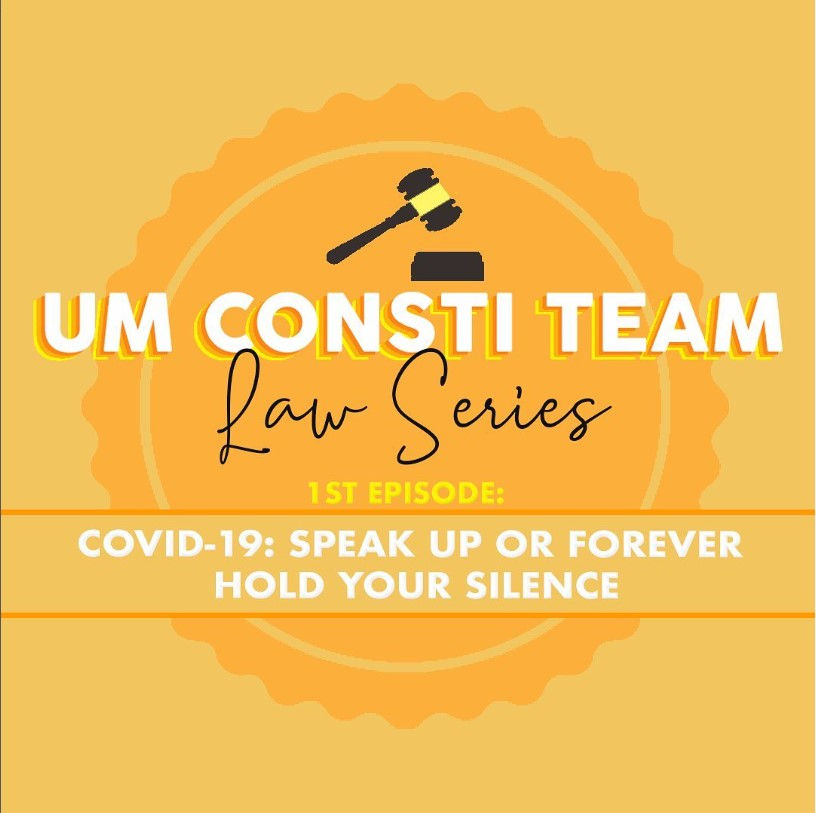Episode 1: Covid 19: Speak Up or Forever Hold Your Silence
- UM Consti Team
- Jul 23, 2022
- 4 min read
Welcome to UM Consti Team's law review. In our first episode, we will discuss about the peddling of fake news amidst this pandemic, and further discuss about our rights on the freedom of speech and the boundaries stretch alongside current laws and regulations. We are excited to share our ideas and hopefully, inspire you through our law review! Here we go!

COVID-19 changed our lives in ways we never thought possible. Our daily routines had evolved drastically ever since the enforcement of Movement Control Order (MCO) to curb the virus outbreak. The amount of fake news sky-rocketed and people are more prone to be misled after increasing exposure - being constantly glued to their phones. Consequently, they might accidentally spread inaccurate information believed to be true on social platforms.
To raise awareness on this issue, UMCT would like to express our view on the freedom of speech. Read on to know about your rights and to understand how far boundaries stretch alongside current laws and regulations.
THE CONSTITUTION AND RELEVANT LEGISLATIONS
Based on Article 10 of the Federal Constitution, clause 1(a) confers every citizen a right to freedom of speech and expression. However, this article must be read together with Article 10(2) which authorises Parliament to impose restrictions if necessary for the following purposes: protecting Federation securities and relations with other countries, public order or morality, privileges of Parliament or Legislative Assemblies, or providing against contempt of court, defamation, or incitement to any offence.
Laws have been regulated to supplement/define Article 10(2); such as,
1. Section 505(b) of Penal Code states that
“Whoever makes, publishes or circulates any statement, rumour or report with intent to cause, or which his likely to cause, fear or alarm to the public, or to any section of the public whereby any person may be induced to commit an offence against the State or against the public tranquillity.”
A person who commits this offence will be charged with two years of imprisonment, a fine or both. However, if that person spread the news believing it to be true, the act will not amount to an offence within the meaning of the section. This section prevents people from spreading fake news to the public and inducing unnecessary panic in society.
2. Section 233 of Communications and Multimedia Act 1998
A person who knowingly initiates the transmissions of any form of communication through network facilities which is obscene, indecent, false, menacing or offensive in character which intend to annoy, abuse or harass another person can be liable to a fine not exceeding RM 50,000 or to imprisonment for a term not exceeding one year or to both and shall also be liable to a further fine of RM 1000 for every day during which the offence is continued after conviction.
3. Sedition Act 1948.
In layman terms, the word ‘sedition’ means anything that disrupts social harmony. It is defined extensively in Section 3(1) of the Sedition Act. Although Section 3(2) of the same act provides exceptions to the general meaning in subsection 1, the Act is very broad and can picture “excessively vague” definition of sedition as alleged by human rights advocates.
In 2015, amendments were made to the Act to include an online media ban, granting the Government power to block out electronic media deemed to be seditious. Penalties became harsher, with offenders scrambling to a mandatory jail term between three and seven years. A few bloggers, like Raja Petra Kamarudin, Syed Akbar Ali and Syed Azidi Syed Aziz, were charged under this Act.
RECOMMENDATIONS
In light of this worldwide crisis, here are some suggestions we can all practise to avoid falling victim to fake news.
Always fact-check and refer to reliable sources for new information.
Be sensitive in expressing or voicing out your opinions and be considerate to all parties.
Adhere to orders and to be mindful when dealing with your opinions.
CONCLUSION
Communication is an integral aspect of our life as it greatly impacts our culture and the quality of our democracy. Freedom of speech and expression is our treasured asset. Today, safeguarding our freedom of expression is more critical than ever. So many citizens have come to conclude that dialogue and discourse are inadequate; they are pursuing a culture that can aggressively repress opposition.
When it comes to freedom of speech, the lawmakers are often tasked with the burden in striking a perfect balance to attain moderation. We ask: how much is too much? How far is too far? Here’s the catch - instead of confining the perimeters of what can or cannot be said, we should be focusing on the importance of what is said within those bounds. Freedom of speech is a basic principle of the democratic process. It means citizens will explore concepts, share ideas and debate. This fundamental right helps people and groups to discover and exchange content that is essential to them without interference or retaliation. On a serious note, the decision to give a speech nowadays in a highly connected world must be carefully considered and calibrated with a full appreciation of all the consequences it might cause.
.png)



Comments